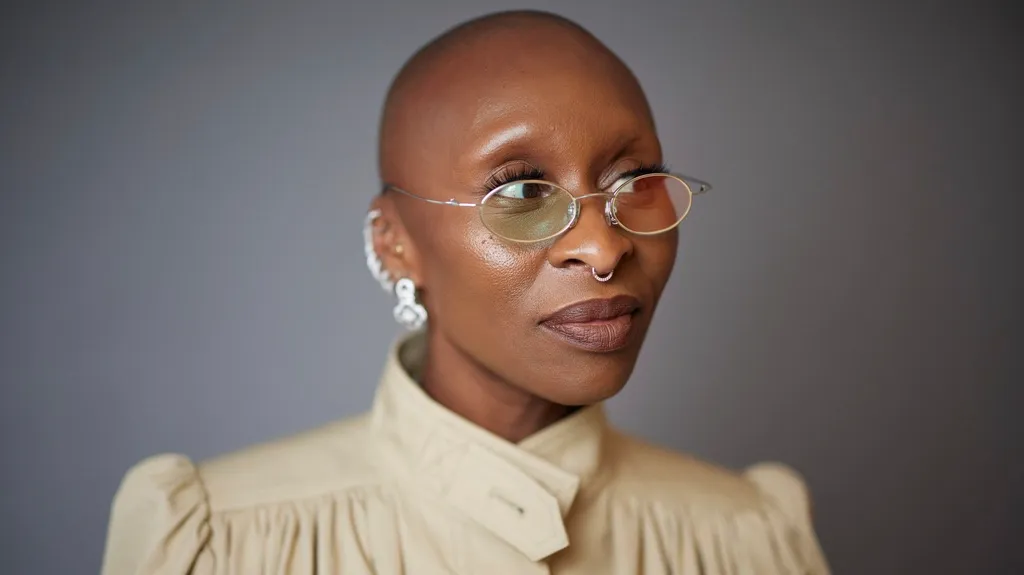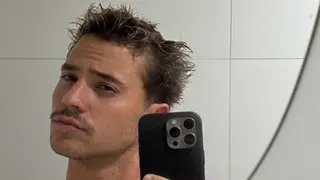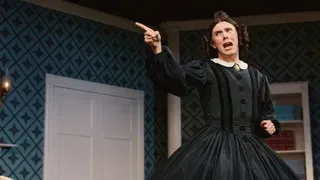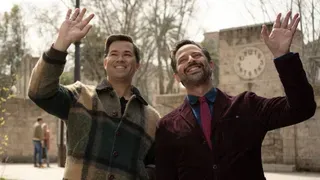April 13, 2011
Drag legend & puppeteer extraordinaire team for 'Arias With a Twist'
Joseph Erbentraut READ TIME: 9 MIN.
While performance artist and drag performer Joey Arias has established quite a name for himself over a career which spans decades in New York City, his star has yet to shine far beyond the city he calls home, with the notable exception of his turn as the mistress of seduction in the Cirque du Soleil-gone-cabaret show Zumanity in 2003.
But, as the subject of a new documentary, Arias With a Twist, spotlighting his innovative and well received collaborative show with acclaimed puppeteer Basil Twist, Arias' talent -- channeling Billie Holiday's pipes and Bettie Page's vamp factor -- appears to be just on the verge of a wider audience. The documentary, directed by filmmaker Bobby Sheehan, takes a closer look at Arias and Twist's 2008 show at the HERE Arts Center, which was nominated for a Drama Desk Award and described by the New York Times as "seamless" and "enchanted."
The film has been shown in film festivals throughout the world, including the Berlin festival, Frameline and Tribeca, and now is set to make its Chicago debut as part of the Chicago International Movies & Music (CIMM) Festival on Thursday, April 14, at Berlin Nightclub.
EDGE recently spoke with Sheehan to learn more about the film and its off-kilter subjects.
Why a movie?
EDGE: What was the initial inspiration for you to direct Arias With a Twist?
Bobby Sheehan: It's subject matter I kind of grew up with. I was born on the Lower East side of Manhattan, a poor kid from Henry Street. It was basically a ghetto. It was the late '70s and I became more aware of my surroundings. All of these bizarre, 'out there' people and crazy artists moved into East Village and I just kind of joined that pack. It felt more comfortable for me to be with people who preferred to be different from the other people around them. I started to go to clubs and hung out with those people and one of the first real prominent personalities I became friends with was Joey Arias. Joey was very much the center of attention, running around with Klaus Nomi, and they were just out there. They seemed to be the frontrunners. Fortunately for me, Joey took a liking to me and he was like my VIP pass.
I was very fortunate to be in New York at that time. When I look back on it with a romanticized point-of-view, it was very free and open and people were creative and weren't motivated by fame -- like today with reality shows making people instantly famous. It was just creative people mingling and creating things just for their own entertainment. This was fertile ground for people like Klaus and Joey. There were no barriers.
EDGE: So when did Joey's show with Basil Twist enter into the picture as the main subject of the documentary? Why create this documentary now?
BS: I've stayed in touch with Joey all these years. He's definitely my oldest surviving friend. I'm not interested in the New York downtown scene, which doesn't exist today as far as I know, though it may be coming back a bit. But I knew Joey was doing a production with Basil. I hadn't gotten around to seeing it initially but when I did see it, it was just such an enormously joyful experience for me. Basil and Joey together is such a potent creative tsunami and I think seeing them brought me back to that romanticized version of New York in the late '70s or early '80s, though nothing then was certainly as sophisticated or organized as Basil is.
But while sitting in this small theater in 2009, here was this incredibly imaginative beyond description theatrical event using music, fashion and puppetry. Within a few minutes of watching the production, I decided it was time to do the Joey film. Joey and I had been talking about doing some sort of documentary about him and this seemed like perfect timing. Joey has a strange and unusual arc as an artist and the time is now here to do a documentary about an artist that only a handful of people really know. That is unfortunate. From that initial motivation, it became more layered because Basil is such an incredible artist as well. I had an entire adult lifetime of being educated in the work of Joey but I knew nothing about puppetry. I began to care deeply about Basil and his art form.
Making the film was an unbeatable creative experience for me, dealing with the stuff I love and am predisposed to love -- Joey and his insanity -- as well as another artist who opened my eyes to another world of art. From a documentary filmmaking point-of-view, it can never get better than that.
A docufantasy
EDGE: You've labeled this film a "docufantasy" -- could you tell me more about what that term means for you in the context of this project?
BS: The film is a bit of a love letter to the purity of the creative spirit. If there is a fault, it's that, in some people's view of documentary filmmaking, a documentary has to present the negative side, too and make critical observations about why something isn't good. In that sense, it's a bad film because I intentionally wanted to paint a positive picture and go against the grain of a lot of documentary filmmaking. I love documentaries but after a while there's one too many about how horrible government is or how corrupt the bankers are or about the Middle East wars. After a while, there is nothing inspirational to be found in Bernie Madoff. We tried to make something that was intentionally positive and we didn't show Joey in his darkest hours.
If I'd wanted to make a dark and trashy view of anyone, it is doable because the other side of romanticism is some craziness and that's not so pretty. A chapter of the film does touch on the devastation of AIDS, which is out of respect for all the people who died and sort of disappeared. The message in that chapter is that people like Joey need to keep going as an homage to those people who aren't here to appreciate it but still need to be remembered. We need to carry those legacies forward and creativity needs to live. There aren't that many people left from that era.
EDGE: Even if you're breaking away from several norms of documentary filmmaking, you have been well received on the festival circuit, including screenings at Tribeca and Frameline. Was that success surprising to you?
BS: Going to festivals with the film is a tremendously satisfying thing. It's like the port of entry into any kind of potential distribution offers. Our international premiere was at the Berlin Festival and, as part of that event, Joey performed in front of half a million people at their gay Pride parade. Beyond that, getting into festivals can be kind of tricky. We missed the Sundance deadline, so we had our domestic premiere at the Tribeca festival, which was perfect. It's a New York film. The trick now is to continue to do the festival circuit with the hope that we can get as wide a distribution as possible.
EDGE: Has it been challenging to carry that success forward to attain a solid distribution deal for the film? Why do you think that is?
BS: We have had some distribution offers but we're just trying to see what the best configuration could be to avoid it getting locked away and signed away to a distributor. Once you create this thing, you have to flip from being creative to being logistic. It's a tricky business because it's hard to compete with Hollywood marketing dollars and the crap they produce. I think the trick is that hopefully people who go to film festivals will make it known that they want to see films like this on a regular basis instead of just once a year.
I think there is a hunger out there among audiences for creativity that's more pure than just watching someone who wants to be famous or rich. I hope to God there is a backlash to all of this American Idol reality crap because it's all kind of vile. On one hand, it celebrates people who are talented, but for the bulk of people on those shows, it's just humiliation television.
Distribution blues
EDGE: What has been the most rewarding aspect of creating this film for you?
BS: Filming Joey and Basil doing anything is an extremely pleasurable experience, so definitely actually creating it. They're not prima donnas. You just show up and create with them; it's very collaborative. As soon as it was done came the stuff that is not so great: Entering into film festivals and white knuckling whether you'll get into the festivals you want. It's very anxiety-ridden and hard to get past the film festival level.
EDGE: Which touches on some of the issues we just spoke about.
BS: The old distribution models are dead and it's hard to compete with big Hollywood machine. Every year, a small film seems to do well that changes the definition of "small film." Crazy Heart was considered a "small" art film when it was made for $7 million, but an indie filmmaker still can't compete with that. They can't get Jeff Bridges or $7 million. But I think all the rules are changing and it's an interesting time. Every year there are great documentaries coming out, so it's great that even with all these difficulties, the quality of documentaries seems to be doing very well, which is inspiring and encouraging -- even if it makes it more competitive as there are no longer just a handful of good documentaries released each year.
EDGE: What are your hopes for the film in the months ahead?
BS: We've been invited to a film festival in Bologna, Italy in June and, to be honest, we're kind of film "festivaled" out. We're weighing the options of self-distributing the DVD because of the potential use of the Internet and once we make that decision, we'll probably approach more festivals again with a new sense of purpose -- letting people know they can buy the film.
EDGE: Are you optimistic about the film going forward? Why is this a film that people need to check out?
BS: I think the film shows a sense of artistic community which I think is really important. Joey and Basil genuinely care about each other as creative collaborators and not competitors and in this day and age that is rare. It's not about all about "me," it's about "us" and there aren't many "us" films around. From a business perspective, making this film is stupidity, but these artists are creative and are doing things that are worthy of being recognized and celebrated. More of these films should be made.
It's not about an artist who just tragically committed suicide who has a lot of dirt on them or a famous person who is a train wreck. Joan Rivers is a walking train wreck. That film is also worth seeing, but Arias With a Twist is intentionally not a train wreck. The best feedback I've gotten is people who say they wanted to write music or create a painting or do something creative after watching it and that makes me feel good.
'Arias With a Twist' screens Thursday, April 14, at 9 p.m. at Berlin Nightclub, 954 W. Belmont Avenue. Visit www.cimmfest.org for tickets and more information.
Joseph covers news, arts and entertainment and lives in Chicago. He is the assistant Chicago editor for The Huffington Post. Log on to www.joe-erbentraut.com to read more of his work.







